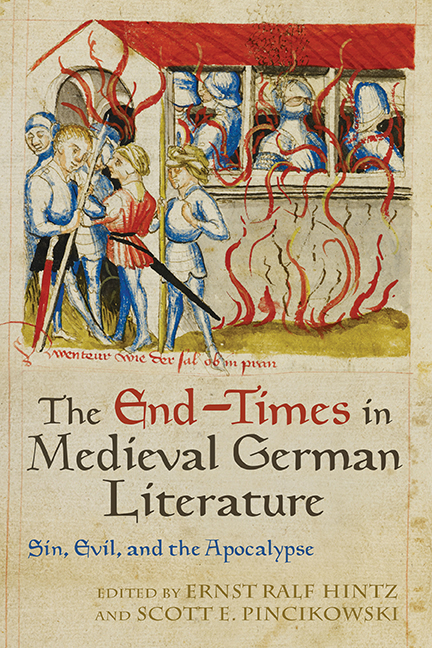Book contents
- Frontmatter
- Dedication
- Contents
- Acknowledgments
- Introduction
- 1 Thiu wirsa giburd: Cain’s Legacy, Original Sin, and the End of the World in the Old Saxon Genesis
- 2 The Heliand Revisited: Spiritual Transgendering and the Defiance of Evil
- 3 The Beginning of the End: Binary Dynamics and Initiative in Hartmann von Aue’s Gregorius
- 4 Poetic Reflections in Medieval German Literature on Tragic Conflicts, Massive Death, and Armageddon
- 5 Beyond Good and Evil: Apocalyptic Vision without Judgment in the Nibelungenlied. An Essay
- 6 End-Times in the Hall: The Modern Reception of the Apocalyptic Ending of the Nibelungenlied
- 7 Past Present, Future Present? Visualizing Arthurian Romance and the Beholder’s Share in a World That Refuses to End
- 8 Ich diene und wirbe / biz ich gar verdirbe: Lovesickness, Apocalypse, and the End-Times in Mauritius von Craûn and Das Nibelungenlied
- 9 The Slippery Concept of Evil in Hartmann von Aue’s Erec and Iwein
- 10 Wigamur’s Lessons on the Complexity of Evil
- 11 The Miracles of the Antichrist
- 12 Monsters and Monstrosities in the Pamphlet Wars of the Reformation
- Notes on the Contributors
- Index
6 - End-Times in the Hall: The Modern Reception of the Apocalyptic Ending of the Nibelungenlied
Published online by Cambridge University Press: 21 March 2020
- Frontmatter
- Dedication
- Contents
- Acknowledgments
- Introduction
- 1 Thiu wirsa giburd: Cain’s Legacy, Original Sin, and the End of the World in the Old Saxon Genesis
- 2 The Heliand Revisited: Spiritual Transgendering and the Defiance of Evil
- 3 The Beginning of the End: Binary Dynamics and Initiative in Hartmann von Aue’s Gregorius
- 4 Poetic Reflections in Medieval German Literature on Tragic Conflicts, Massive Death, and Armageddon
- 5 Beyond Good and Evil: Apocalyptic Vision without Judgment in the Nibelungenlied. An Essay
- 6 End-Times in the Hall: The Modern Reception of the Apocalyptic Ending of the Nibelungenlied
- 7 Past Present, Future Present? Visualizing Arthurian Romance and the Beholder’s Share in a World That Refuses to End
- 8 Ich diene und wirbe / biz ich gar verdirbe: Lovesickness, Apocalypse, and the End-Times in Mauritius von Craûn and Das Nibelungenlied
- 9 The Slippery Concept of Evil in Hartmann von Aue’s Erec and Iwein
- 10 Wigamur’s Lessons on the Complexity of Evil
- 11 The Miracles of the Antichrist
- 12 Monsters and Monstrosities in the Pamphlet Wars of the Reformation
- Notes on the Contributors
- Index
Summary
AT THE END oF Thea von Harbou's sentimental Nibelungenbuch of 1924, stones speak. The tower and palace at Etzel's court mourn the fiery downfall of their brother, the great hall. But appearances are deceiving. Out of the smoldering ruins emerges the voice of the hall, telling his brethren he is not to be mourned, but rather envied, for a young boy has taken up fallen Volker's bow and fiddle and gone out into the world to sing of the burning building and all the heroic events that took place there (267–68). With this ending, von Harbou, who also wrote the screenplay for Fritz Lang's two-part film, Die Nibelungen (1924), connects the violent end of the Nibelungenlied with memorymaking and inverts the original intention behind the destruction of the hall. She glorifies the Germanic past and the heroes who died there, stressing that they will never be forgotten, an integral part of a well-known mythological narrative about German identity: out of the ashes of apocalyptic conflagration arise the German people, loyal and fire-tested. Indeed, von Harbou knew the importance of this particular memory location to making myths for the German people. It is the mnemonic nature and instrumental use of this space that the present paper investigates. Many studies consider related issues concerning the modern reception of the Nibelungenlied, such as the use of characters or events for political and ideological reasons during the tumultuous years of Wilhelmine, Weimar, and Nazi Germany. My approach builds on these studies but differs from them by adopting the methodology of recent cultural analysis that investigates the meaning of physical space in the cultural imagination, in this case the Germanic hall that is so central to the tragic, apocalyptic ending of the Nibelungenlied.
There have been so many cultural reimaginings of this space, starting in the early Middle Ages and continuing through the postmodern era, that the destruction of the hall can be considered what Jan Assmann calls an Erinnerungsfigur: events, people, and locations that loom so large in the cultural memory that they are instrumental to creating cultural identity.
- Type
- Chapter
- Information
- The End-Times in Medieval German LiteratureSin, Evil, and the Apocalypse, pp. 120 - 143Publisher: Boydell & BrewerPrint publication year: 2019



